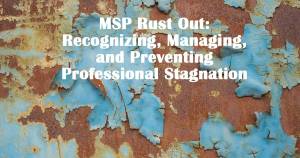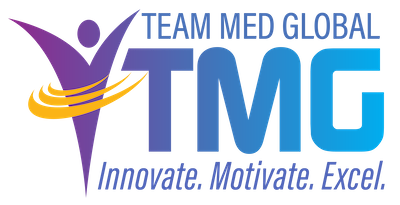 While our role as MSPs can be incredibly rewarding, we are not immune to the challenges that can lead to professional stagnation or “rust out.”
While our role as MSPs can be incredibly rewarding, we are not immune to the challenges that can lead to professional stagnation or “rust out.”
Rust Out vs. Burn Out
Rust out is a gradual decline in motivation, job satisfaction, and overall professional engagement over time. As opposed to burnout, which is characterized by excessive stress, exhaustion, and feelings of overwhelm, rust out often occurs when MSPs feel underutilized, unchallenged, and disengaged in their work.
The relationship between rust out and burnout is noteworthy. While burnout often results from excessive demands and relentless stress, rust out can stem from a lack of meaningful challenges and opportunities for growth. As MSPs, we may find ourselves in situations where routine tasks dominate our work, leaving us feeling like we are not making a meaningful impact or using our skills to their full potential. Over time, this can lead to a sense of stagnation and disillusionment.
Symptoms of Rust Out
Recognizing the symptoms of rust out is essential for addressing the issue promptly. Here are some common signs to watch out for:
Lack of Motivation: MSPs experiencing rust out may struggle to find motivation for our daily tasks. We may feel uninterested in our work and may no longer feel the drive to excel.
Boredom and Disengagement: Feeling constantly bored with repetitive tasks and disconnected from the job is a telltale sign of rust out. We may start to daydream or lose focus easily.
Decreased Productivity: A decline in productivity and the quality of work can occur as a result of rust out. Tasks that used to be completed efficiently may take longer or be completed with less care.
Emotional Exhaustion: While not as severe as burnout, rust out can lead to emotional exhaustion. We may become irritable, frustrated, or indifferent to their responsibilities.
When Can Rust Out Happen in the MSP Field?
Rust out can affect MSPs at various points in their careers, and it may be more likely to occur in certain situations:
Long-Term Employment: After several years in the same role, we may become susceptible to rust out if we have not had new challenges or opportunities for advancement.
Repetitive Tasks: If we are consistently tasked with routine work without opportunities for skill development or growth, rust out can set in.
Lack of Recognition: Feeling undervalued or unappreciated by colleagues and superiors can contribute to rust out.
Changes in Role or Responsibilities: A sudden reduction in responsibilities or a shift in job duties without adequate support or guidance can also trigger rust out.
How to Manage Rust Out
Managing rust out requires proactive efforts to reignite professional passion and engagement. Here are some strategies MSPs can implement:
Seek New Challenges: Look for opportunities to take on new projects or responsibilities that challenge your skills and knowledge.
Professional Development: Invest in ongoing education and training to stay updated and motivated.
Communication: Discuss your concerns with your supervisor or manager. They may be able to adjust your workload or offer opportunities for growth.
Self-care: Prioritize self-care practices to maintain physical and mental well-being.
Networking: Connect with other MSPs or to exchange ideas and experiences.
What Managers and Team Leaders Can Do to Prevent Rust Out
Managers and team leaders play a crucial role in creating a work environment that minimizes the risk of rust out among MSPs. Here are some steps they can take:
Regular Check-ins: Schedule regular one-on-one meetings with your staff to discuss MSPs’ job satisfaction, challenges, and career aspirations.
Task Rotation: Encourage a variety of tasks and responsibilities to keep work interesting and challenging.
Recognition and Appreciation: Acknowledge and reward MSPs’ contributions to the team and organization.
Professional Development: Provide opportunities for training and career advancement, fostering a culture of continuous learning.
Feedback Culture: Create an environment where MSPs feel comfortable providing feedback and suggesting improvements.
Rust out can have a significant impact on MSPs’ job satisfaction and overall well-being. By recognizing the symptoms and taking proactive steps to manage and prevent it, MSPs and their managers can work together to create a fulfilling and engaging work environment in the field of medical staff services.

